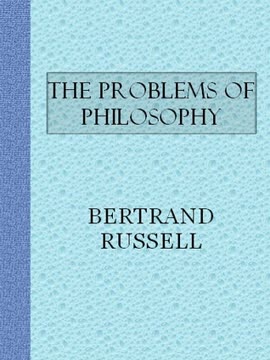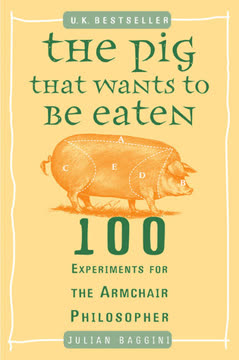Key Takeaways
1. Reason requires judgment, not just logic
Judgement is therefore not some additional 'factor X' that allied to sound logic yields good philosophy: it is an inherent part of the philosophical process.
Reason is not algorithmic. While logic and evidence are crucial components of rational thinking, they are not sufficient on their own. Good reasoning requires the use of judgment to weigh arguments, assess evidence, and draw conclusions. This human element cannot be reduced to formal rules or procedures.
Judgment fills the gaps. In real-world reasoning, we often face incomplete information, competing values, and the need to make decisions under uncertainty. Judgment allows us to navigate these complexities by:
- Evaluating the strength and relevance of evidence
- Considering context and implications
- Balancing competing considerations
- Recognizing when to be more or less confident in conclusions
Embracing judgment improves reasoning. Rather than seeing judgment as a flaw or weakness in rationality, we should recognize it as an essential feature. By acknowledging the role of judgment, we can:
- Be more self-aware about our reasoning processes
- Critically examine our assumptions and biases
- Engage more productively with those who disagree
- Avoid the pitfalls of excessive certainty or nihilistic skepticism
2. Science relies on personal elements, not pure objectivity
Scientists all agree that, ultimately, data are sovereign. The problem is that often the data are not of such a clear, unambiguous and theory-independent kind that they can be used to resolve a dispute definitively.
Scientific objectivity is aspirational. While the scientific method strives for objectivity, in practice scientific work always involves subjective elements. Scientists are human beings with personal dispositions, aesthetic preferences, and intuitions that shape their work.
Key personal factors in science include:
- Choice of research topics and questions
- Interpretation of ambiguous data
- Aesthetic judgments about theories (e.g. elegance, simplicity)
- Decisions about when evidence is sufficient to accept or reject hypotheses
- Social and institutional factors (e.g. funding, peer review)
Acknowledging subjectivity strengthens science. Rather than undermining science, recognizing these personal elements can improve scientific practice by:
- Encouraging transparency about assumptions and methodological choices
- Fostering more rigorous scrutiny and debate of scientific claims
- Promoting diversity in scientific perspectives and approaches
- Helping the public understand the provisional nature of scientific knowledge
3. Philosophical thinking is shaped by personal dispositions
To say that character influences the way we think without letting it threaten the detached objectivity of philosophy. It's the same way that scientists reassure themselves that their methods do not fundamentally depend on individual quirks and foibles.
Philosophers are not blank slates. Like all humans, philosophers bring their personal experiences, temperaments, and cultural backgrounds to their work. These factors shape the questions they find interesting, the intuitions they trust, and the arguments they find compelling.
Key influences on philosophical thinking:
- Early life experiences and education
- Personality traits (e.g. tolerance for ambiguity, need for closure)
- Cultural and historical context
- Emotional dispositions and aesthetic preferences
- Intellectual traditions and mentors
Implications for philosophy:
- Diversity in philosophical perspectives is valuable and inevitable
- Self-awareness about personal influences is crucial for rigorous thinking
- Engagement across different philosophical traditions is essential
- The history of philosophy should be understood in its biographical and cultural context
- Philosophical disagreements may sometimes reflect differences in disposition rather than pure logic
4. Emotions and intuition play a vital role in reasoning
To be rational entails having the ability to recognise that a rational argument has conclusions that are in some sense demanded by it, not merely invited.
Reason is not purely cognitive. While traditional views of rationality emphasize conscious, deliberative thinking, modern psychology and neuroscience reveal that emotions and intuitions are integral to human reasoning. These "hot" cognitive processes are not mere distractions but essential components of effective decision-making and moral judgment.
Key roles of emotion and intuition in reasoning:
- Providing motivation and salience to guide attention and action
- Offering rapid, holistic assessments of complex situations
- Integrating diverse information and experiences
- Generating hypotheses and creative solutions
- Grounding moral reasoning in empathy and social understanding
Balancing "hot" and "cold" cognition. The challenge is not to eliminate emotion and intuition from reasoning, but to cultivate their productive integration with more deliberative processes. This involves:
- Developing emotional intelligence and self-awareness
- Learning to recognize when intuitions are reliable or misleading
- Using conscious reasoning to refine and critique intuitive judgments
- Cultivating moral emotions like empathy and compassion
- Recognizing the limits of pure logic in real-world decision-making
5. Morality cannot be grounded solely in reason
Morality is not a requirement of disinterested rationality, but this argument has also shown why the alternative to this is not the view that rationality has nothing to contribute to morality.
Moral reasoning requires more than logic. While reason plays a crucial role in ethical deliberation, it cannot provide the ultimate foundation for morality. Attempts to derive moral obligations from pure reason alone inevitably fail because they cannot bridge the gap between facts and values.
Key limitations of pure reason in ethics:
- Cannot determine fundamental values or goals
- Struggles to resolve conflicts between incommensurable values
- Fails to account for the motivational force of moral beliefs
- Neglects the role of emotion and intuition in moral judgment
A balanced approach to moral reasoning:
- Recognize that moral intuitions and emotions provide essential starting points
- Use reason to critically examine and refine moral beliefs
- Employ philosophical analysis to clarify concepts and expose inconsistencies
- Draw on empirical evidence to understand the consequences of moral choices
- Engage in dialogue to bridge different moral perspectives
- Acknowledge the inevitability of some moral uncertainty and disagreement
6. Science informs but does not determine ethics
Science cannot tell us whether we should pursue happiness or excellence, for example, and it is, frankly, hard to even imagine how it might do so.
Science has limits in ethics. While scientific knowledge is crucial for making informed moral decisions, it cannot on its own determine what we ought to do. Science can tell us about the factual consequences of our actions, but it cannot resolve fundamental questions of value or priority.
Ways science contributes to ethics:
- Providing empirical information about the effects of actions
- Clarifying conceptual confusions (e.g. about personhood or consciousness)
- Revealing unexpected consequences of moral choices
- Informing us about human nature and social dynamics
- Helping to implement ethical goals effectively
Limitations of science in ethics:
- Cannot derive "ought" from "is" without additional moral premises
- Does not resolve conflicts between competing values
- May not capture all morally relevant aspects of a situation
- Cannot determine the ultimate goals or purposes of human life
- Is itself guided by values that require ethical justification
Integrating science and ethics: The challenge is to use scientific knowledge to inform ethical reasoning without reducing ethics to a purely scientific enterprise. This requires:
- Clearly distinguishing empirical claims from value judgments
- Recognizing the role of moral philosophy in framing ethical questions
- Using scientific evidence to test and refine moral theories
- Fostering dialogue between scientists, philosophers, and the public on ethical issues
7. Reason has normative force but is not infallible
To accept that an argument is rational and objective is to accept that oneself and others ought to believe what it is an argument for.
Rationality creates obligations. When we recognize an argument or reason as rationally compelling, we implicitly acknowledge that we ought to believe its conclusion. This normative force of reason is what allows for genuine dialogue and the possibility of changing our minds based on evidence and argument.
Key aspects of reason's normative force:
- Creates a sense of obligation to believe what is rationally justified
- Provides a shared standard for evaluating claims across different perspectives
- Allows for criticism and revision of beliefs based on better reasons
- Underpins the possibility of progress in knowledge and understanding
Balancing confidence and humility. While reason has normative force, we must also recognize the fallibility of human reasoning. This tension requires:
- Confidence in the power of reason to improve our understanding
- Humility about the limits of our current knowledge and reasoning abilities
- Openness to revising beliefs in light of new evidence or arguments
- Recognition that rational disagreement is possible on many complex issues
- Commitment to ongoing dialogue and inquiry rather than dogmatic certainty
8. Political pluralism is essential for democracy
Political pluralism accepts that there is no one way of ordering society so as to satisfy completely all legitimate aspirations for the good life.
Diversity requires accommodation. In any modern society, citizens hold a wide range of values, beliefs, and conceptions of the good life. A democratic political system must find ways to accommodate this diversity rather than imposing a single vision on all.
Key principles of political pluralism:
- Recognition of legitimate diversity in values and ways of life
- Commitment to negotiation and compromise between competing interests
- Protection of minority rights and viewpoints
- Institutional structures that allow for power-sharing and representation
- Cultivation of civic virtues like tolerance and respect for difference
Benefits of political pluralism:
- Promotes social stability by reducing polarization and conflict
- Allows for creative problem-solving through diverse perspectives
- Protects against tyranny of the majority
- Fosters a more dynamic and adaptable society
- Respects the autonomy and dignity of citizens
Challenges of pluralism: Balancing unity and diversity is an ongoing challenge that requires:
- Identifying shared values and principles to ground civic life
- Developing fair procedures for resolving conflicts between competing values
- Fostering dialogue and mutual understanding across difference
- Maintaining social cohesion while respecting diversity
9. Secularism enables religious freedom and civic discourse
Secularism is the most powerful bulwark against sectarianism we have.
Secularism protects diversity. A secular political order does not privilege any particular religion or non-religion, but rather creates a neutral public sphere where citizens of all beliefs can participate equally. This enables genuine religious freedom and productive civic discourse.
Key principles of secularism:
- Separation of religious institutions from state institutions
- No state endorsement or funding for particular religions
- Equal rights and protections for citizens regardless of belief
- Religious freedom, including freedom from religion
- Public reasoning based on shared secular values and evidence
Benefits of secularism:
- Protects religious minorities from discrimination
- Prevents religious conflicts from dominating politics
- Allows for cooperation across religious divides
- Fosters critical thinking and scientific inquiry
- Enables social progress on issues where religious views diverge
Balancing secularism and religious expression:
- Allowing religious voices in public discourse while requiring secular justifications for policy
- Protecting religious freedom without enabling religiously-motivated discrimination
- Respecting cultural traditions with religious roots while maintaining state neutrality
- Fostering interfaith dialogue and cooperation in civil society
10. Populism threatens reasoned political debate
Populism is diametrically opposed to pluralism: it promotes a single set of values instead of a plurality, offers simplistic solutions instead of complex compromises, and represents the people as a uniform whole rather than a community of diverse communities and individuals.
Populism oversimplifies. Populist movements often present complex political issues in simplistic terms, pitting a virtuous "people" against corrupt "elites" or dangerous "others." This rhetoric undermines the nuanced reasoning and compromise necessary for democratic governance.
Key features of populism:
- Appeal to a homogeneous conception of "the people"
- Anti-elite and anti-establishment rhetoric
- Simplistic solutions to complex problems
- Skepticism or hostility towards experts and institutions
- Charismatic leadership claiming to embody the popular will
Dangers of populism:
- Erosion of democratic norms and institutions
- Polarization and demonization of opponents
- Neglect of minority rights and interests
- Rejection of evidence-based policymaking
- Vulnerability to authoritarian tendencies
Countering populism: Preserving reasoned political debate requires:
- Improving civic education and media literacy
- Fostering engagement between diverse communities
- Addressing legitimate grievances that fuel populist sentiment
- Demonstrating the value of expertise and complex solutions
- Cultivating political
Last updated:
FAQ
What's The Edge of Reason about?
- Exploration of Rationality: Julian Baggini's The Edge of Reason examines the role of rational thought in modern society, highlighting its decline and advocating for its rehabilitation.
- Four-Part Structure: The book is divided into four parts—The Judge, The Guide, The Motivator, and The King—each exploring different facets of reason and its application in areas like morality and politics.
- Personal and Societal Impact: Baggini discusses how personal biases and societal influences shape our reasoning, emphasizing a balanced approach that includes both rational and emotional understanding.
Why should I read The Edge of Reason?
- Relevance to Modern Issues: The book addresses the decline of rational discourse in public debates, making it pertinent in an era dominated by misinformation and emotional reasoning.
- Philosophical Depth: Baggini draws on historical and contemporary philosophical thought, making complex ideas accessible and practically applicable.
- Encourages Critical Thinking: It challenges readers to reflect on their reasoning processes and biases, promoting a more nuanced understanding of engaging with differing viewpoints.
What are the key takeaways of The Edge of Reason?
- Importance of Reason: Baggini argues that reason is crucial for resolving conflicts and making informed decisions, warning against debates devolving into mere opinion.
- Role of Judgement: Rationality requires personal judgement, influenced by emotions and experiences, which must be acknowledged for effective reasoning.
- Community of Reason: He advocates for a "community of reason" where diverse opinions are discussed openly, fostering mutual understanding and respect.
What are the best quotes from The Edge of Reason and what do they mean?
- “We have lost our reason...”: This quote highlights the book's central theme of the decline of rational thought in society, suggesting a collective failure that needs addressing.
- “Reason is a human faculty...”: It emphasizes that reason is shaped by individual experiences and emotions, calling for an integrated view of rationality.
- “Rational argument should be defined...”: This encapsulates Baggini's definition of rationality, stressing the need for arguments to be comprehensible and interest-neutral.
How does Baggini define reason in The Edge of Reason?
- Thin vs. Thick Conceptions: Baggini distinguishes between thin (general appeal) and thick (specific methods) conceptions of reason.
- Community of Reason: He advocates for a conception that allows diverse opinions but prevents any belief from being considered reasonable.
- Objective Reasons for Belief: Rational argument involves providing objective reasons that are comprehensible and assessable by any rational agent.
What is the role of judgement in rationality according to The Edge of Reason?
- Inherent to Reasoning: Judgement is essential for interpreting evidence and making decisions, not just a fallback when logic fails.
- Philosophy’s Dirty Secret: Baggini suggests philosophers often overlook judgement, favoring a rigid, logical approach.
- Influence of Personality: Personal characteristics and experiences shape judgements, leading to different conclusions from the same evidence.
What are the myths of rationality discussed in The Edge of Reason?
- Myth of Pure Objectivity: Baggini critiques the idea that reason can operate without subjective judgement, emphasizing personal biases and emotions.
- Myth of Reason as Chief Guide: He challenges the notion that reason should be the sole guide, highlighting the role of emotions and values.
- Myth of Rationality as Universal: Rationality is not a universal standard; cultural and personal contexts lead to varying interpretations.
How does The Edge of Reason relate to contemporary issues?
- Decline of Rational Discourse: Baggini addresses the trend of dismissing rationality in favor of emotional appeals, undermining meaningful dialogue.
- Impact of Psychology: The book incorporates psychological insights to illustrate how unconscious biases affect reasoning.
- Call for a Rational Community: He advocates for spaces where rational discourse thrives, encouraging engagement with differing viewpoints.
What is the significance of the trolley problem in The Edge of Reason?
- Moral Dilemma: The trolley problem illustrates the conflict between consequentialist and deontological ethics, showing divergent moral conclusions.
- Psychological Insights: It reveals the interplay between emotion and rationality in moral decision-making, highlighting ethical reasoning's complexity.
- Judgement in Ethics: The problem exemplifies the role of judgement in ethics, requiring personal judgement beyond logical deduction.
How does Baggini propose we recover our reason in The Edge of Reason?
- Understanding Reason: Recovery begins with understanding reason's function and the interplay between rationality and personal judgement.
- Engaging in Dialogue: He advocates for a community of reason where diverse perspectives are discussed openly, fostering mutual respect.
- Critical Thinking: Emphasizes critical thinking and self-reflection to navigate complex issues effectively.
What is Baggini's view on homeopathy in The Edge of Reason?
- Evidence Against Efficacy: Baggini presents studies showing homeopathy is no more effective than a placebo, critiquing anecdotal evidence.
- Rational Argument Framework: Homeopathy illustrates how rational arguments fail without objectivity and interest-neutrality.
- Critique of Belief Selection: He critiques selective evidence use in homeopathy, reflecting a non-interest-neutral approach to rationality.
What critiques does Baggini make about populism in The Edge of Reason?
- Simplistic Solutions: Populism offers overly simplistic solutions to complex issues, undermining nuanced political discourse.
- Threat to Pluralism: It erodes political pluralism by promoting a singular narrative that dismisses diverse perspectives.
- Rational Discourse: Baggini advocates for reasoned discussion in politics, emphasizing accommodating different views over populist rhetoric.
Review Summary
The Edge of Reason receives mostly positive reviews, with readers praising its insightful analysis of rationality and reason in modern society. Reviewers appreciate Baggini's nuanced approach, recognizing the importance of reason while acknowledging its limitations. The book's exploration of reason in relation to religion, science, psychology, morality, and politics is commended. Some find certain sections challenging, but overall, readers value the book's timely message about the need for a revised understanding of reason in today's world.
Similar Books
Download PDF
Download EPUB
.epub digital book format is ideal for reading ebooks on phones, tablets, and e-readers.














